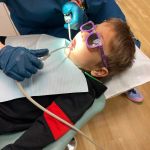What Does Dental Insurance Cover for Elderly Patients?
Dental care is an essential part of maintaining overall health, particularly for elderly patients. As we age, our dental needs change, and with those changes come new challenges. Unfortunately, dental insurance for seniors can sometimes be a confusing topic. What exactly does dental insurance cover for elderly patients? In this article, I will break down the key aspects of dental insurance for seniors and help you understand what you can expect when it comes to coverage, benefits, and potential out-of-pocket costs.
1. Importance of Dental Care for Elderly Patients
As we get older, dental health becomes even more critical. Seniors are often at a higher risk for dental issues like gum disease, tooth decay, and tooth loss. Poor oral health can also lead to other serious health conditions, such as heart disease, diabetes, and even dementia. This makes it essential to maintain a regular dental care routine, which is why understanding what dental insurance covers is so important.
For elderly patients, dental care may include more than just cleanings and checkups. It might also involve restorative treatments such as fillings, crowns, or dentures. Some seniors may also require specialized care for conditions like dry mouth, tooth sensitivity, or gum recession. Knowing how dental insurance works for seniors can help ensure they get the care they need without facing overwhelming costs.
2. Types of Dental Insurance Plans for Seniors
There are several types of dental insurance plans available to elderly patients, each with different levels of coverage. The most common options include:
- Standalone Dental Insurance – These plans are purchased separately from any health insurance and offer coverage for preventive care, basic dental procedures, and major dental work.
- Medicare Advantage Plans – Some Medicare Advantage plans include dental coverage as part of the overall health plan. However, the coverage can vary widely between plans, and it may not cover all dental procedures.
- Medicare Part A & Part B – While traditional Medicare does not cover routine dental care, it may cover certain dental procedures if they are required as part of a medical procedure (such as surgery).
- Dental Discount Plans – These plans are not insurance but offer discounts on dental procedures when used with participating dentists.
It’s essential to compare the coverage options of each plan to determine which one best suits your needs. Many Medicare Advantage plans now offer comprehensive dental coverage, but it’s crucial to check the specifics of each plan before enrolling.
3. Common Services Covered by Dental Insurance for Seniors
Dental insurance for seniors generally covers a range of services to help maintain good oral health. Here’s a breakdown of the most common services included in dental plans:
- Preventive Care – This includes routine exams, cleanings, and X-rays. These services are usually fully covered, or only require a small co-payment, as they are vital for maintaining good oral health.
- Fillings – Dental insurance typically covers fillings for cavities. The coverage may vary depending on the type of material used (e.g., silver amalgam or tooth-colored fillings).
- Extractions – If a tooth is too damaged to save, extraction may be necessary. Many dental plans cover extractions, although some may limit coverage to extractions related to medical needs.
- Root Canals – For seniors with severely decayed or infected teeth, root canals may be covered by dental insurance. This procedure can help save a tooth and prevent the need for extraction.
- Crowns and Bridges – Dental crowns and bridges are often necessary for restoring damaged teeth. Many dental insurance plans cover at least a portion of the cost for these procedures.
- Dentures and Partials – Many seniors require dentures or partials to replace lost teeth. These are usually covered by most dental plans, though some may require a waiting period before coverage kicks in.
It’s important to note that the extent of coverage can vary depending on the insurance provider and specific plan. For example, while routine cleanings are often covered at 100%, major services like crowns or root canals may be covered at a lower percentage (typically 50-80%) after meeting a deductible.
4. Exclusions in Dental Insurance for Elderly Patients
While dental insurance can provide valuable coverage, there are some exclusions to be aware of. Common exclusions in dental insurance plans for seniors include:
- Cosmetic Procedures – Dental insurance generally does not cover cosmetic procedures, such as teeth whitening or veneers, unless medically necessary.
- Implants – Many dental plans do not cover dental implants, as they are considered a cosmetic procedure. However, some plans may offer partial coverage.
- Orthodontics – While braces and other orthodontic treatments are often covered for children, they are rarely covered for adults under standard dental insurance plans.
- Waiting Periods – Some plans may have waiting periods for certain services, meaning that you may need to be enrolled in the plan for a certain amount of time before coverage for major procedures kicks in.
It’s essential to carefully review your dental insurance policy and understand the exclusions. If you require certain treatments not covered by your plan, you may want to explore alternative options like dental discount programs.
5. Cost Considerations for Seniors Seeking Dental Care
The cost of dental care can be a significant concern for seniors, especially for major dental procedures like crowns, root canals, and dentures. Even with insurance, seniors may still face out-of-pocket costs such as co-payments, deductibles, and non-covered procedures.
In addition to traditional dental insurance, there are other ways to reduce costs, including:
- Dental Savings Plans – These plans provide discounted rates on dental procedures when visiting participating dentists.
- Financing Options – Many dental offices offer financing plans that allow seniors to pay for expensive treatments over time.
- Government Assistance – Some states offer dental assistance programs for low-income seniors, which can help cover the cost of essential dental care.
When considering dental insurance, it’s also important to factor in the cost of premiums and any potential out-of-pocket expenses. Researching your options and understanding the cost-benefit ratio can help you make the best decision for your needs.
SEO Title: Dental Insurance Coverage for Seniors: What’s Included?SEO Keywords: dental insurance for seniors, elderly dental coverage, dental care, dental plans, senior dental servicesSEO Description: Learn what dental insurance covers for elderly patients, including common services like cleanings, fillings, dentures, and more. Find out how to get the best coverage.






 Cascade Orthodontics4.0 (621 review)
Cascade Orthodontics4.0 (621 review) Lino Lakes Family Dentistry5.0 (110 review)
Lino Lakes Family Dentistry5.0 (110 review) Aspen Dental - Springfield, MO4.0 (563 review)
Aspen Dental - Springfield, MO4.0 (563 review) Mountainside Dental Group - Rancho Santa Margarita4.0 (117 review)
Mountainside Dental Group - Rancho Santa Margarita4.0 (117 review) Smile Design Studio Of Hyde Park LLC4.0 (367 review)
Smile Design Studio Of Hyde Park LLC4.0 (367 review) Harmony Dental Health4.0 (259 review)
Harmony Dental Health4.0 (259 review) The Importance of Oral Health Education During Pregnancy for a Healthy Pregnancy
The Importance of Oral Health Education During Pregnancy for a Healthy Pregnancy Best Tips for Brushing Your Teeth Properly for Healthy Gums: Essential Techniques for Oral Health
Best Tips for Brushing Your Teeth Properly for Healthy Gums: Essential Techniques for Oral Health Why Skipping Dental Checkups Can Lead to Bigger Oral Health Problems
Why Skipping Dental Checkups Can Lead to Bigger Oral Health Problems Advantages of Porcelain Dental Restorations
Advantages of Porcelain Dental Restorations How Can Diabetes Cause Tooth and Gum Problems? Preventing and Managing Oral Health Issues
How Can Diabetes Cause Tooth and Gum Problems? Preventing and Managing Oral Health Issues Healthy Habits for Promoting Good Oral Health and Hygiene: Tips for a Healthy Smile
Healthy Habits for Promoting Good Oral Health and Hygiene: Tips for a Healthy Smile